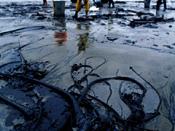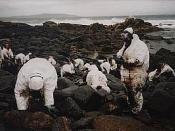Abstract
A study on the effects of Penecillium and Pseudomonas aeruginosas on degradation was carried out. The oil samples where directly inoculated in glass test tubes and where studied over the course of a week. There were growth and Ph changes observed for both the fungi and bacteria. Both demonstrated efficiency in metabolizing oil.
Introduction Due to oil spills, the earth's ever-increasing amounts of pollution, and the continued high demand for refined oil, learning how to remediate the damage done has become highly significant. Ye Shuhong (2005) reports one of the major challenges in the application of oil bioremediation is the lack of guideline regarding how and when to use this technology. Studies are being done to determine the most effective and least costly methods of oil degradation.
In this experiment, the oil samples where directly introduced to the fungi and bacteria and left at room temperature, with no adjustment to the PH levels, in order to simulate the natural processes.
Materials and Methods Two tubes with 10ml of distilled water (p.H 7.0) where mixed with 10 ml of refined oil (p.H 4.0). 50ul of Psuedomonas was added to the first tube and 50ul of Penecillium was added to the second tube. The samples where left at a room temperature of 70 degrees, for a week.
Results Growth was observed in both samples, the penicillin doing best. In terms of metabolizing the oil, the Pseudomas contained the least amount of unaffected oil.
Conclusion
The study demonstrated the direct inoculation of oil was an effect method but I believe that under controlled condition, the procedure could yield a higher amount of degraded oil. The temperature appeared to be ideal for the growth of penicillin but perhaps a more accommodating ph and temperature would have suited the bacteria or...



Pretty good
Short, but a useful article.
1 out of 1 people found this comment useful.